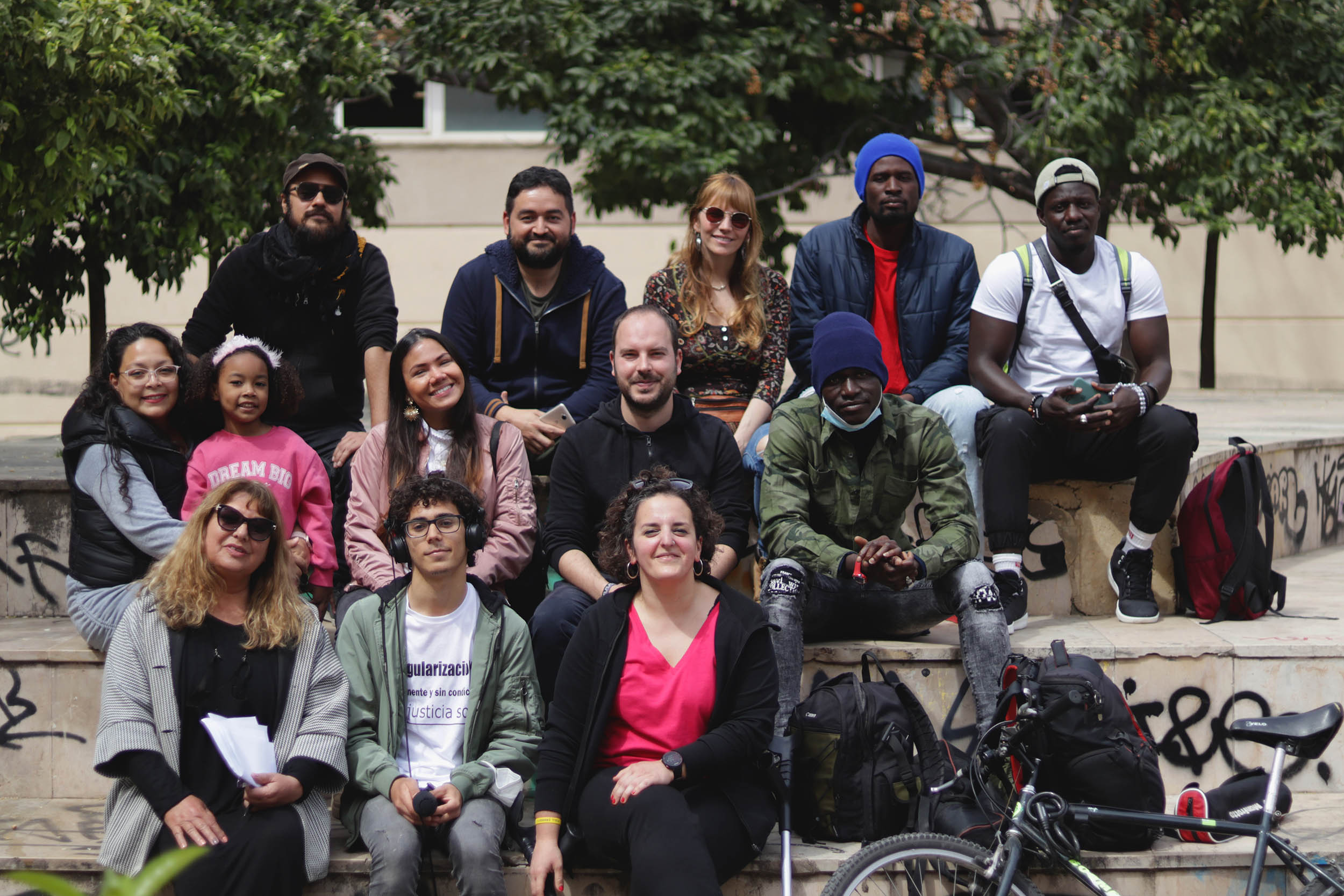
“Disseminate the topics that interest us such as migrant people It is fundamental, because what is unknown is feared and, thus, it is made known to us in an honest way,” says Patricia Azpelicueta, who was born in Argentina 58 years ago and has lived in Spain for two decades. She has been one of the participants in the participatory documentary production workshop which has organized the Valencia International Film and Human Rights Festival, Humans Fest.
Continuing with the words of Patricia, who studied film direction and has participated in similar activities before: “It is important that a festival like this provides a space to tell our stories without intermediaries from our point of view and, above all, from the wealth of perspectives. For example, my work group was made up of a person from Morocco, another from Venezuela, another from Spain and me, who is from Argentina. “We each had different views.”
This workshop is part of the parallel programming of the XIII edition of the Humans Fest, which has set the objective that migrants can claim their rights, denounce the different violence who suffer and be protagonists of Valencian audiovisual generating their own content, which breaks stereotypes. Held from April 7 to 10, it had the collaboration of CEAR País Valencià, Jesuit Migrant Service, Valencia Acoge, the Consulate of Colombia, Por Ti Mujer and the Women, Voices and Resistances association.
Tani Alexandra Aparicio, also participating in this activity, agrees on the need to promote activities like this. Originally from Colombia, she is 28 years old and she migrated to Spain about five years ago. She is a Social Worker specialized in Human Rights, Peace and Sustainable Development, but she has not been able to practice as such here. While solving multiple procedures for this, she is taking on care, cleaning and hospitality jobs.
“The Humans Fest workshop has meant being able to create our own narratives and have a space learning and of exchange to communicate what we feel and what we want in the best possible way to Spanish society. We start from the need to transform the existing spaces, mostly white and privileged, into new ones where we can express the human rights violations to which we are subjected and to which we are in constant risk, such as treats and even the death when we are condemned to return to the contexts from which we fled trying to safeguard our lives,” explains Tani.
The activity has brought together a total of Twelve people from different countries (Senegal, Mali, Venezuela, Spain...) who have been accompanied by the team of Harvest, a Valencian production company specialized in audiovisual as a tool for social change. The workshop has given rise to three participatory short films that will premiere during Humans Fest, which this year will be held from June 9 to 18. The premiere, like most of the festival's screenings, will be accompanied by a round table with the authors of these works and the entities involved.
CINEMA IS ALSO PRODUCED IN PICASSENT PRISON
Humans Fest has traditionally hosted screenings of cinema in it Picassent Penitentiary Center (Valencia). This year, in addition, it has launched a participatory documentary to prisoners, who have attended several workshops given by the Alberto Pla Agency, which has accompanied them so that they themselves, in a pioneering way, produce and record "You choose"; an audiovisual work that tells the story of four people deprived of liberty in this prison and the consequences of the decisions they make during their stay. The documentary is part of the “Futures in Freedom” project of the Justice Foundation in collaboration with the Valencia City Council and will have a special screening at the 13th edition of the festival.
VALENCIAN YOUTH PUT THEIR TALENT FOR THEIR HR
On the other hand, Humans Fest includes a specific awards category for microfilms about human rights: “1 minute 1 border”. The festival organization has promoted participation among the Valencian youth by generating meetings between students from various schools and professionals of third sector, so that they know the reality of migrants living in Valencia and are encouraged to carry out audiovisual work to reflect it.
Specifically, close to 70 students of Design and Creative Technologies, Fine Arts and Animation of the Polytechnic University of Valencia, the Barreira design school and the Training Cycle for the Promotion of Gender Equality of the IES de la Misericordia have met with representatives of the CIES NO platform, Valencia Welcomes and Doctors Without Borders. “At a time when hate speech is gaining ground in politics, it is more important than ever for youth to reflect on inequalities, privileges, inclusion o identity from the concept of border. And cinema is a good way to do it,” explains Majo Siscar, director of the Humans Fest.
Based on these debates, the students are preparing one-minute visual essays, which will be exhibited during the days of the festival. Their short films will compete, as every year, for their own prize awarded by the public and worth 300 euros.
AN INCLUSIVE AND UNSTOPPABLE PARALLEL PROGRAMMING
These activities are part of the parallel programming of the festival, which this year will showcase more than thirty films in different neighborhoods and towns in the city of Valencia. In addition to the screenings, Humans Fest will complete its celebration in June with other activities, such as round tables, workshops, concerts, exhibitions… All of this, around migrations and against hate speech.
“Humans Fest, promoted by the Foundation for Justice For thirteen years, it has been an opportunity to raise awareness about human rights among very diverse audiences. We would like the festival to go beyond the screens and involve more citizens with these proposals,” concludes José Mª Tomás y Tío, president of Fundación por la Justicia.
Humans Fest is a project of the Foundation for Justice that is possible thanks to the support of the Generalitat Valenciana, the Ajuntament de València, the Diputació de València and Caixa Popular.
